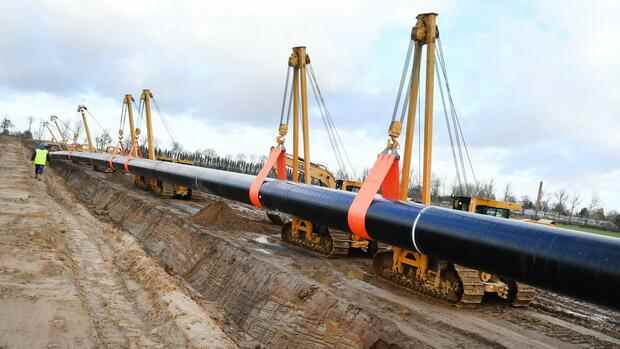The natural gas storage facilities in Germany are currently significantly emptier than in previous years.
(Photo: dpa)
Brussels, Berlin The gas storage reserves in Germany are at a low level. The filling level “fell below the 60 percent mark,” said Sebastian Bleschke, managing director of the Initiative Energiespeicher (INES), the Handelsblatt. The operators of natural gas storage facilities have joined forces in the initiative.
With a current level of around 59 percent, it is at a “historically low level” compared to previous years. At the moment there is a strong utilization of the storage facilities. Significantly more is saved than saved.
“Since the actual winter is still ahead, the comparatively low storage reserves should certainly be handled carefully,” said Bleschke. “If the withdrawal proceeds as it is at the moment, the storage level will be very low in February,” warned the INES managing director.
To prevent a bottleneck in February, Trading Hub Europe GmbH has launched a special tender for the procurement of natural gas, which should be available in February. The special announcement ends on Friday. Trading Hub Europe is owned by various long-distance gas network operators. The company is responsible for the market area for Germany and must ensure that natural gas supply and demand are continuously balanced.
Top jobs of the day
Find the best jobs now and
be notified by email.
In contrast to the oil market, there are no state-prescribed stocks in the gas market. Rather, the use of the gas storage facility solely follows the requirements of the market. The special tender represents a market-compliant mechanism for securing the gas supply.
However, it remains to be seen whether there are bidders who are willing to enter into a delivery commitment for February. In view of the current market situation, procurement will be “definitely challenging”, said INES managing director Bleschke. The Federal Ministry of Economics called the special tender a “normal process”.
EU Commission presents proposals for decarbonising the gas market
The subject is also a concern of the EU Commission, which on Wednesday presented a series of legislative proposals to decarbonise the gas market. This also includes measures to prevent future gas supply crises.
According to the Commission’s proposals, the Member States should coordinate the filling of their gas storage facilities with one another and also have the option of creating joint gas reserves on a voluntary basis.
Specifically, governments should always keep an eye on their storage capacities and potential risks in connection with security of supply. When risks are identified, they must act and fill the stocks.
At the beginning of the heating season, the federal states should also ensure that their storage tanks are filled to a high level. “The more gas there is in the warehouse, the better the EU can bridge gas supply bottlenecks,” said EU Energy Commissioner Kadri Simson at the presentation of the legislative package.
In addition, the authority wants to set a limit for long-term gas contracts: These should not be extended beyond 2049. In the year 2050 the EU wants to be climate neutral, ergo to have phased out all fossil fuels, including gas.
More: Gas at a friendship price: How Russia uses supply contracts as leverage
